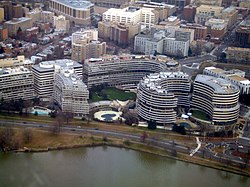Eugenio Martínez
Eugenio (Musculito) Martínez | |
|---|---|
| Born | Eugenio Rolando Martínez July 8, 1922 |
| Occupation | real estate agent |
| Known for | Participation in the Watergate Scandal |
| Watergate scandal |
|---|
 |
| Events |
| People |
Eugenio Rolando Martínez (alias Musculito, born July 8, 1922) was a member of the anti-Castro movement in the early 1960s, and later was one of the five men recruited by G. Gordon Liddy and E. Howard Hunt in 1972 for the Memorial Day weekend Watergate burglary at the Democratic National Committee (DNC) headquarters in Washington, D.C. He later worked as a real estate agent.[1]
Weeks after the initial break in, on June 17, 1972, the men were arrested by District of Columbia Police inside DNC headquarters during what they said was a second entry into the building to correct problems with the first break-in. Martinez and the others were convicted in the ensuing Watergate scandal. The others were Frank Sturgis, Virgilio Gonzalez, Bernard Barker and James McCord. After completing his prison term, Martinez was pardoned by President Ronald Reagan in 1983.[2]
On August 31, 2016, the conservative watchdog group Judicial Watch obtained CIA internal documents, through a FOIA request, that stated Martinez was a paid asset of the Agency at the time of the break in. Although his connection to the Agency was acknowledged, until this release the CIA had maintained that his service had ended and he no longer had an association with the Agency for at least two years prior to the incident at the Watergate Hotel.[1]
References
- ^ a b CIA author classified (1973-08-22). "Subject: Eugenio R. Martinez" (PDF). Central Intelligence Agency. Retrieved 2017-12-05.
{{cite web}}:|author=has generic name (help) - ^ Welch, William M. (November 26, 1987). "Power To Pardon Unquestioned And Often Used By Reagan". Associated Press. AP. Retrieved December 30, 2012.
